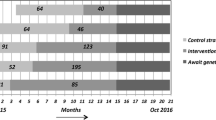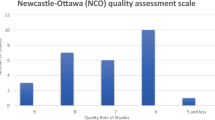Abstract
In developing countries, low budgets make the issue of integrating genetics into clinical practice a challenge, a situation in which the use of family history (FH) becomes important for patient care, as it is a low cost strategy and a risk assessment tool. The purpose of this study was to review medical records of patients with colorectal cancer (CRC) seen in a public University Hospital and evaluate how often FH of cancer is registered. Initially we searched a database for patients who were seen in our hospital between 2002 and 2004 with the diagnosis of CRC. We found 415 patients, 104 of whom were excluded. A total of 311 charts were reviewed and classified into 3 groups. Group A: no FH documented; group B: FH was documented, but FH of cancer was not collected; and group C: FH of cancer was documented. We also investigated what type of information was recorded, in order to verify if important elements were assessed. Ninety-eight charts (31.5%) were classified in group A, 20 (6.5%) in group B, and 193 (62%) in group C. In addition, we observed that important information regarding affected relatives was not collected in most of the charts. In conclusion, we found that although FH of cancer was recorded in 62% of charts of patients with CRC, information that could be relevant for risk assessment and management of at-risk families was missing. Our findings expose an important problem in health education that could reflect negatively in the quality of medical assistance to individuals at risk for familial cancer.
Similar content being viewed by others
Abbreviations
- CAPES:
-
Coordenação de Aperfeiçoamento de Pessoal de Nível Superior (a Brazilian public research funding agency)
- CRC:
-
Colorectal cancer
- FAP:
-
Familial adenomatous polyposis
- FH:
-
Family history
- HNPCC:
-
Hereditary nonpolyposis colorectal cancer
- SUS :
-
Sistema Único de Saúde (Brazilian Public Health System)
References
Teixeira HV, Teixeira MG (2003) Financiamento da Saude pública no Brasil: a expriência do SIOPS (Public health financing in Brazil: the Siops experience). Ciência e Saúde Coletiva 8(2):379–391
Scheuner MT, Wang SJ, Raffel LJ, Larabell SK, Rotter JI (1997) Family history: a comprehensive genetic risk assessment method for the chronic conditions of adulthood. Am J Med Genet 71(3):315–324
Yoon PW, Scheuner MT, Khoury MJ (2003) Research priorities for evaluating family history in the prevention of common chronic diseases. Am J Prev Med 24(2):128–135
Ramsey SD, Burke W, Pinsky L, Clarke L, Newcomb P, Khoury MJ (2005) Family history assessment to detect increased risk for colorectal cancer: conceptual considerations and a preliminary economic analysis. Cancer Epidemiol Biomarkers Prev 14(11):2494–2500
Guttmacher AE, Collins FS, Carmona RH (2004) The family history–more important than ever. N Engl J Med 351(22):2333–2336
Rich EC, Burke W, Heaton CJ, Haga S, Pinsky L, Short MP et al (2004) Reconsidering the family history in primary care. J Gen Intern Med 19(3):273–280
Khoury MJ, Little J, Burke K (2004) Human genome epidemiology. New York: Oxford University Press
Love RR, Evans AM, Josten DM (1985) The accuracy of patient reports of a family history of cancer. J Chronic Dis 38(4):289–293
Sweet KM, Bradley TL, Westman JA (2002) Identification and referral of families at high risk for cancer susceptibility. J Clin Oncol 20(2):528–537
Severin M (1999) Genetic susceptibility for specific cancers: medical liability of the clinician. Cancer 86:2564–2569
Lynch HT (2002) Cancer family history and genetic testing: are malpractice adjudications waiting to happen? Am J Gastroenterol 97(3):51
Lynch HT, Follett KL, Lynch PM, Albano WA, Mailliard JL, Pierson RL (1979) Family history in an oncology clinic: implications for cancer genetics. JAMA 242(12):1268–1272
Church J, McGannon E (2000) Family history of colorectal cancer: how often and how accurately is it recorded? Dis Colon Rectum 43(11):1540–1544
Murff HJ, Byrne D, Syngal S (2004) Cancer risk assessment: quality and impact of the family history interview. Am J Prev Med 27(3):239–245
Fuchs CS, Giovannucci EL, Colditz GA, Hunter DJ, Speizer FE, Willett WC (1994) A prospective study of family history and the risk of colorectal cancer. N Engl J Med 331(25):1669–1674
Lynch HT, Lynch PM, Albana WA (1979) Hereditary cancer: ascertainment and management. CA Cancer J Clin 29:216–232
St. John DJB, McDermott FT, Hopper LJ, Debney EA, Johnson WR, Hughes ESR (1993) Cancer risk in relatives of patients with common colorectal cancer. Ann Intern Med 118:785–790
Manne S, Markowitz A, Winawer S, Guillem J, Meropol NJ, Haller D et al (2003) Understanding intention to undergo colonoscopy among intermediate-risk siblings of colorectal cancer patients: a test of a mediational model. Prev Med 36:71–84
Lynch HT, Boland CR, Rodriguez-Bigas MA, Amos C, Lynch JF, Lynch PM (2007) Who should be sent for genetic testing in hereditary colorectal cancer syndromes? J Clin Oncol 25(23):3534–3542
Umar A, Risinger JI, Hawk ET, Barrett JC (2004) Testing guidelines for hereditary non-polyposis colorectal cancer. Nat Rev Cancer 4(2):153–158
Boardman LA (2002) Heritable colorectal cancer syndromes: recognition and preventive management. Gastroenterol Clin N Am 31:1107–1131
Vasen HFA, Möslein G, Alonso A, Bernstein I, Bertario L, Blanco I et al (2007) Guidelines for the clinical management of Lynch syndrome (hereditary non-polyposis cancer). J Med Genet 44:353–362
van Dijk DA, Oostindiër MJ, Kloosterman-Boele WM, Krijnen P, Vasen HFA (2007) Family history is neglected in the work-up of patients with colorectal cancer: a quality assessment using cancer registry data. Fam Cancer 6:131–134
Umar A, Boland CR, Terdiman JP, Syngal S, de la Chapelle A, Rüschoff J et al (2004) Revised Bethesda guidelines for hereditary nonpolyposis colorectal cancer (Lynch syndrome) and microsatellite instability. J Natl Cancer Inst 96(4):261–268
Acknowledgements
We are grateful to Dr. Mark Greene from the National Cancer Institute/NIH for his thoughtful ideas. Financial support was provided for Danilo Viana by Coordenação de Aperfeiçoamento de Pessoal de Nível Superior (CAPES), a Brazilian federal agency for research funding. The authors declare no conflicting interests.
Author information
Authors and Affiliations
Corresponding author
Rights and permissions
About this article
Cite this article
Viana, D.V., Góes, J.R.N., Coy, C.S.R. et al. Family history of cancer in Brazil: is it being used?. Familial Cancer 7, 229–232 (2008). https://doi.org/10.1007/s10689-008-9180-1
Received:
Accepted:
Published:
Issue Date:
DOI: https://doi.org/10.1007/s10689-008-9180-1




